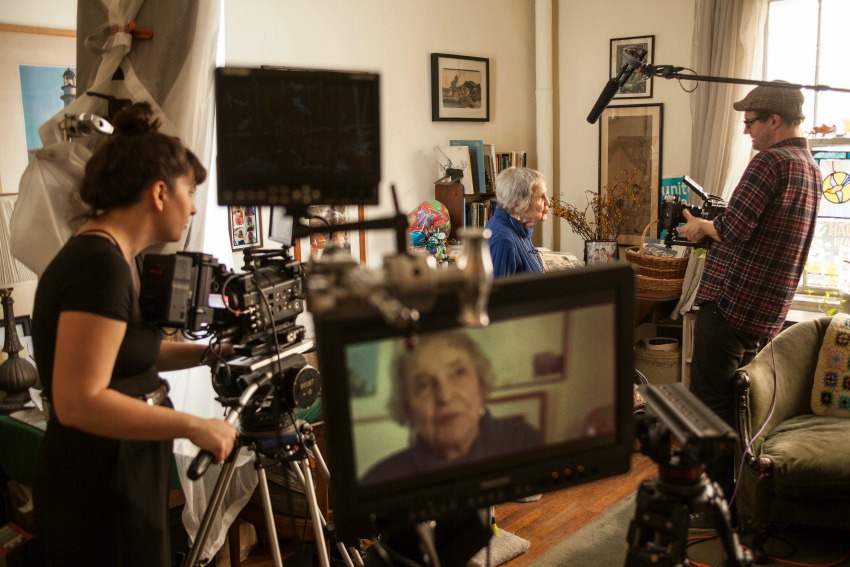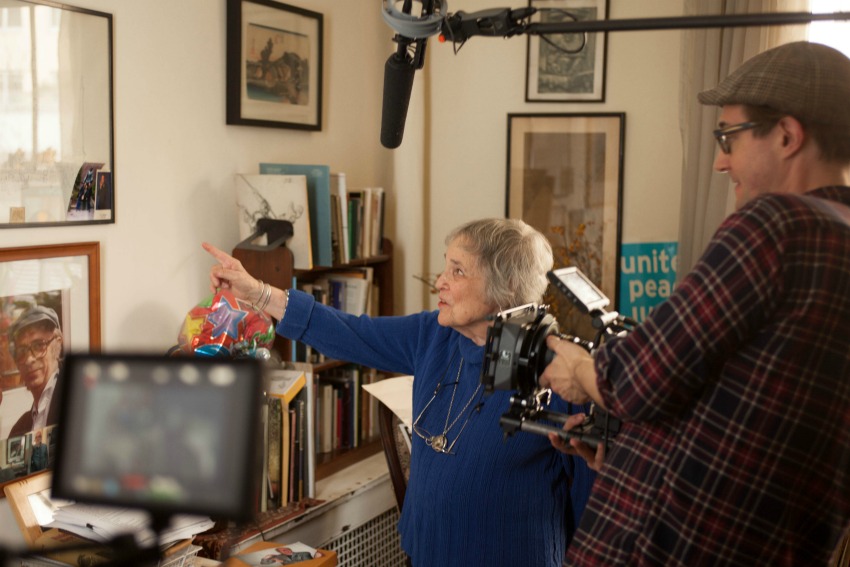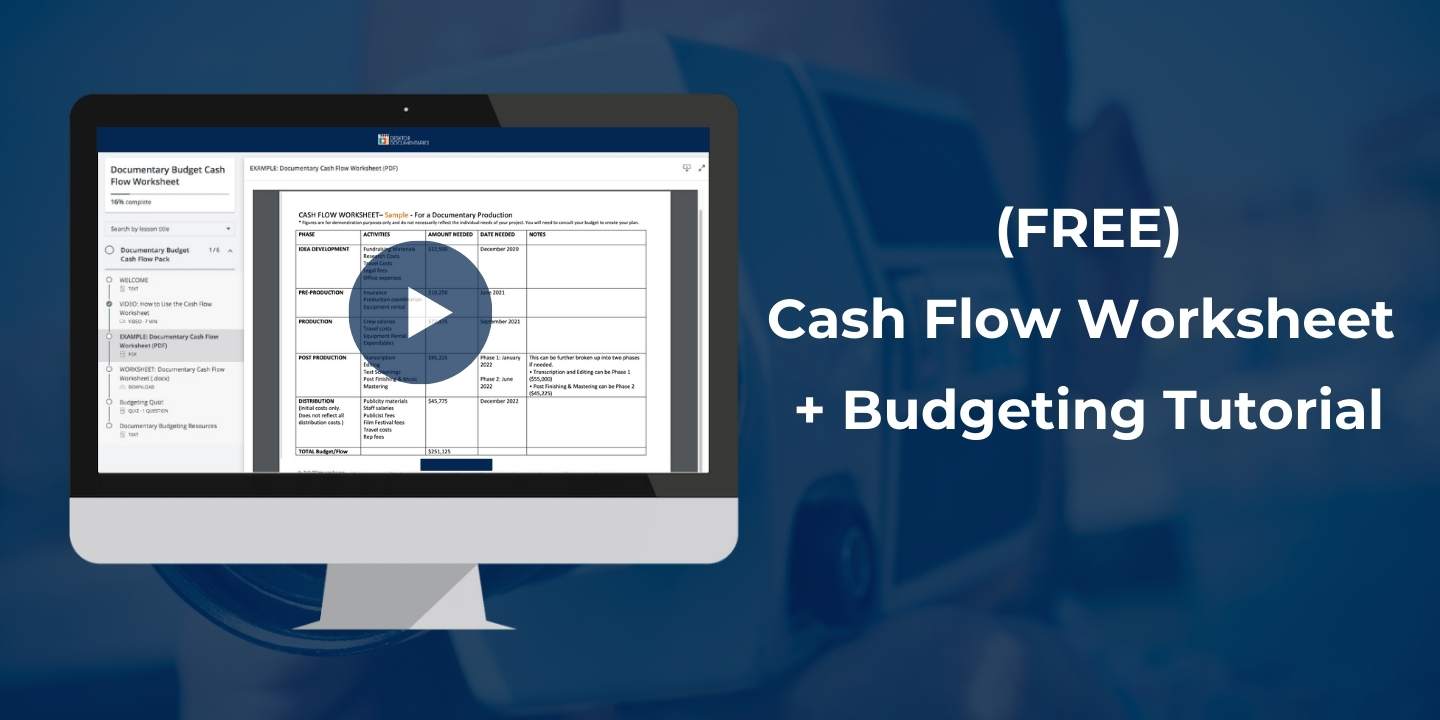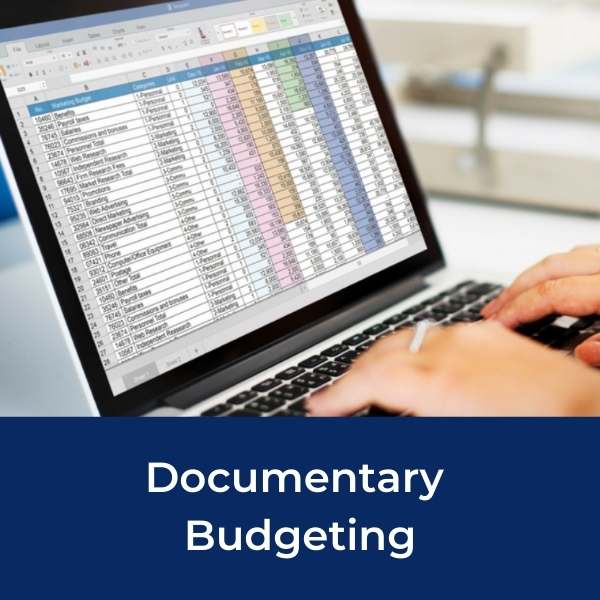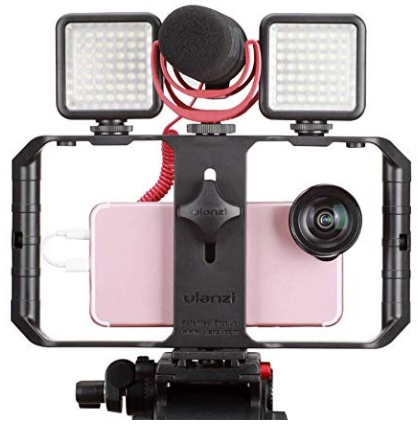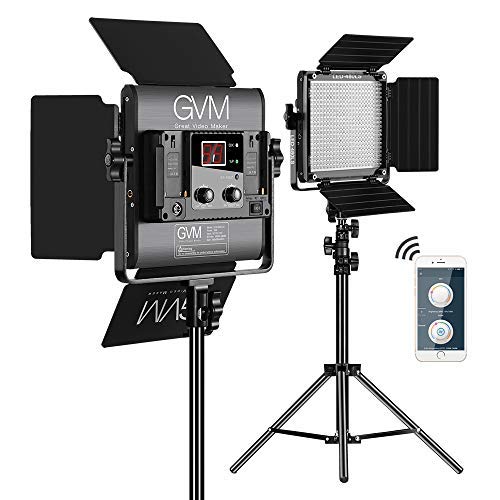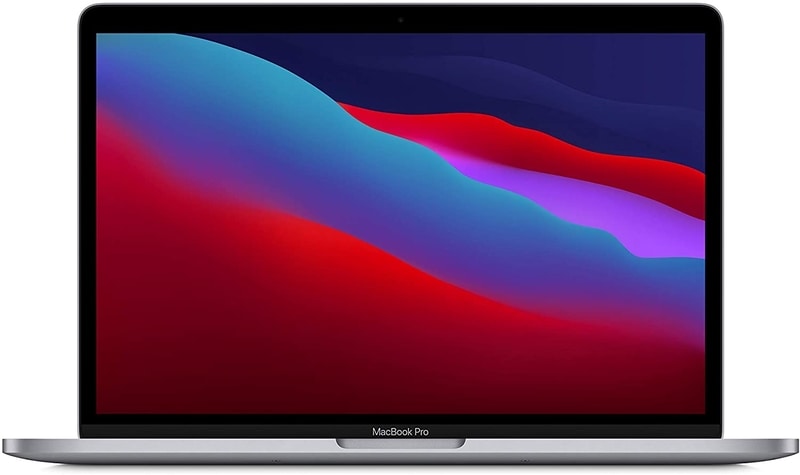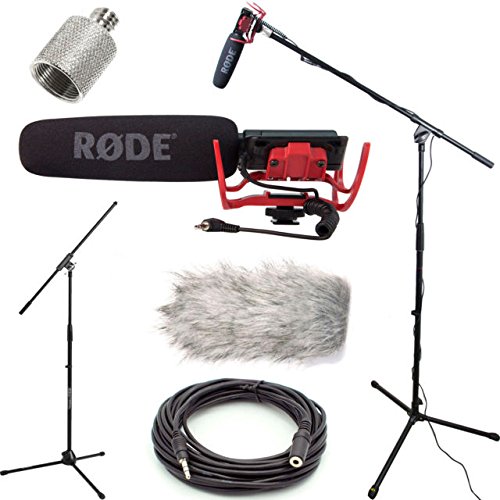How To Raise $15,000 (and Beyond!) For Your First Documentary
Documentary Fundraising Case Study:
DIRECTING RHODA Documentary
with First-Time Director David Williams
Publish Date: May 16, 2017
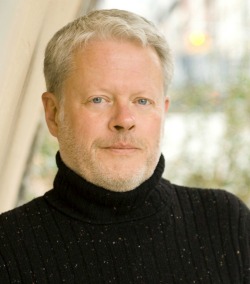 David Williams
David WilliamsDocumentary Fundraising Case Study: New York City-based filmmaker David Williams is doing a LOT right. He's got a fiscal sponsor. Top notch crew. He has a well written concept/treatment. He's also in process of creating a fundraising trailer.
Plus he's got multiple people on his team -- a KEY ingredient to raising funds.
We learned about David after he went through our Documentary Fundraising Course.
We wanted to dive deeper with David to see what he's learning (he's currently in the middle of his fundraising stage), how he managed to raise $15k before even having a trailer, plus his fundraising strategy moving forward.
DIRECTING RHODA, about director and choreographer Rhoda Levine, is David's FIRST documentary project.
Interview with David Williams:
Absolute First Step
What is the absolute first step when making a documentary? (writing a treatment, making a website, finding a fiscal sponsor, shooting an interview, etc)
I’d have to say that the first step is, continuing the metaphor, to kick the tires of the subject of the documentary. While I think this is far easier for a political or social issues project, in our case it was important to research and talk through what makes our one-woman subject a valid and hook-worthy topic for a documentary.
This was fun, but it was also hard. And this process is obviously ongoing.
If I may, at the same time, we formed the business structure for our new production company, establishing an LLC.
Raising The First $15,000
You've raised $15k so far for your project, correct?
That's actually really impressive knowing that you raised those funds without a
trailer. How did you manage to raise those funds without a trailer?
Yes, that’s the amount we raised. And it was raised in increments of hundreds of dollars up to one donation of $2,000.
Without exception, these funds came from friends who believed in the subject of the documentary while at the same time believing in… US!
To explain our project I wrote a detailed, twenty-two page proposal (your template!) that was a follow-up to delivering a brief treatment. It was a two-step process: we shared the proposal only with those deemed worthy of being brought into our tent and who had read the briefer document.
With this being my first documentary, there has been a huge amount of on-the-job-training. And while my most recent career was as an executive director of a nonprofit, the challenge of raising funds for a documentary is unique in many ways. (Your fundraising course was a terrific tool in navigating these shoals.)
Learning all about fiscal sponsorship, where your film funds are channeled through an accredited filmmaker nonprofit (in our case, Independent Filmmaker Project – IFP – in Brooklyn, New York) was one of those unique challenges and afforded us a healthy learning curve. One of our consulting producers, Lisa Gossels, a documentary filmmaker herself, was hired to guide us in the process not only of finding the most appropriate nonprofit to which I would apply, but also helping me fine tune the arc of the documentary and sharpening that unique hook.
Waiting for our application approval from IFP (it took five weeks) was one of those speed bumps in our funding drive that kept us from pitching our project further. Once that was navigated, we were in fact able to interest a number of my friends and those of our producer in helping us secure a certain “tranche” of funding.
Our second speed bump, which we are now on the other side of, was to sit tight, not pitch the film any more until our fundraising trailer was completed. I just approved the final edit of our six-minute teaser… so, now, the real heavy lifting begins.
How To Get Top-Notch Film Crew
How are you managing to get top-notch crew to work on your project with very little funding?
It may have something to do with being in a vibrant filmmaking city like New York. Where there is a large, competitive pool of terrific talent. Finding what I would call our dream crew came about through their willingness to sit down and hear us out on the concept.
Originally, we thought we had a seed-investor, and angel who had been in on earlier discussions of the project. When this went south, we were faced with negotiating with our crew all over again.
One thing we were firm about from the get-go was that we would not ask anyone to work “on spec”. That everyone we dealt with would be dealt with fairly and openly. We would only commit to hiring someone for research, or to commence filming, when we knew we could pay the freight. This is the way we continue to work with our crew.
Though the subject of our film, 85 year-old Rhoda Levine, is pretty much unknown outside her circles of influence in the world of opera, stage and the early days of television, we were encouraged in our hunch that there was a “poem”, or an “ode” to Rhoda as we learned a lot about her life, career and those she impacted. Our hunch became a certitude the more we talked the concept through with those she knew and when our own screening of a film about a similar “unknown” informed, early on, our jumping off point for this project.
Specifically, Ethan Hawke’s SEYMOUR: AN INTRODUCTION. The film was a total charmer to us. And one thing led to another:
a) I contacted the Director of Photography on SEYMOUR, Ramsey Fendall, who met my producer, Ann Meschery, and me for lunch. I think it’s safe to say we hit it off and were, by espresso, finishing each others’ sentences.
b) Ramsey provided introductions to other crew members on that production: Producer Greg Loser, whom we hired (one of our first expenditures) to do a line-by-line review of my budget; and Becca Bender, a terrific, sharp and helpful researcher whom we also hired to go through Rhoda’s voluminous files at the New York Public Library and the United States Holocaust Memorial Museum.
c) Our producer reconnected with Lisa, a former advertising colleague. Turned documentarian and authority on conflict resolution (a handy combination…), Lisa came on board to vet the aforementioned IFP proposal and continue the deep-dish research about what our film would look and feel like. She was indispensible in working with us on drafting the treatment and full proposal for the film.
c) When it came time to hire an editor for our trailer, Ramsey put us in touch with Josh Melrod, himself also an accomplished documentary filmmaker.
What has been the most exhilarating part of pulling together our crew has been the buy-in on the part of everyone. And the creative partnership that has evolved between all of us.
The word “luck” comes to mind.
Get a FREE Documentary Cash Flow Worksheet & Mini-Course
Winning Financial Support
What do you find is THE most important element to convincing a donor to fund your project?
Enthusiasm. Informed enthusiasm.
We’ve found that just because there is giving capacity in someone you know, or are introduced to, there have to be a receptiveness to your particular subject and, importantly, an understanding and an imagination for what a documentary can do for that subject.
A funder has to “get” what documentaries are all about.
Given the opportunity to sit down with a receptive and potential funder, that’s when your excitement can kick in, fueled by all the homework and research that have gotten you to this juncture.
Fundraising Strategy
Do you have a fundraising strategy? If so, would you be willing to share the basic premise of your plan?
We know that the real fundraising work is yet to come. Our kickoff, at which we plan to raise most of the funding needed to complete production (editing and post and marketing yet to follow), will be a premier screening of our trailer at a private club in Manhattan. (We are in a sprint to raise funds just to fund the cost for this event.)
Because Rhoda has directed some of the world’s greatest opera singers and actors, one or two of them are being invited to perform.
All guests at the event – perfect timing: we are hosting it on Rhoda’s 86th birthday – are expected to donate – or pledge -- to the film’s production costs.
Following this event we will follow up, persistently, with any fence-sitters at the event. And since this is only the first, but major, step in our heavy lifting, we will expand our pitching to include all those potential donors out there who were not at this event.
in mid-June we will expand our fundraising efforts through outreach to institutions whose missions are closely entwined with several important, politically significant operas Rhoda directed.
Crowdfunding, which we admittedly have not yet begun to tackle, is on our to do list for later this summer.
NEW! Fundraising Trailer
"Directing Rhoda"
Documentary Idea
How did you first get the idea for your documentary? (Out of all the ideas out there, why this one?)
It was actually pretty serendipitous.
I was introduced to the idea of doing a documentary on Rhoda through a benefactor who had invested in a production that Rhoda had directed in the Midwest. In speaking at the time with our producer, she said she would like “to do something for Rhoda.” My name was floated as a writer for a biography on her. But in the belief that a book would not capture the life and times and spirit of this extraordinary opera director and choreographer (as a woman, almost unheard of in her time – and today), they agreed that I would be a good candidate to direct a film about Rhoda.
Many years after my graduate work in Cinema Studies at NYU, this would be my first documentary film. Again, that word luck…
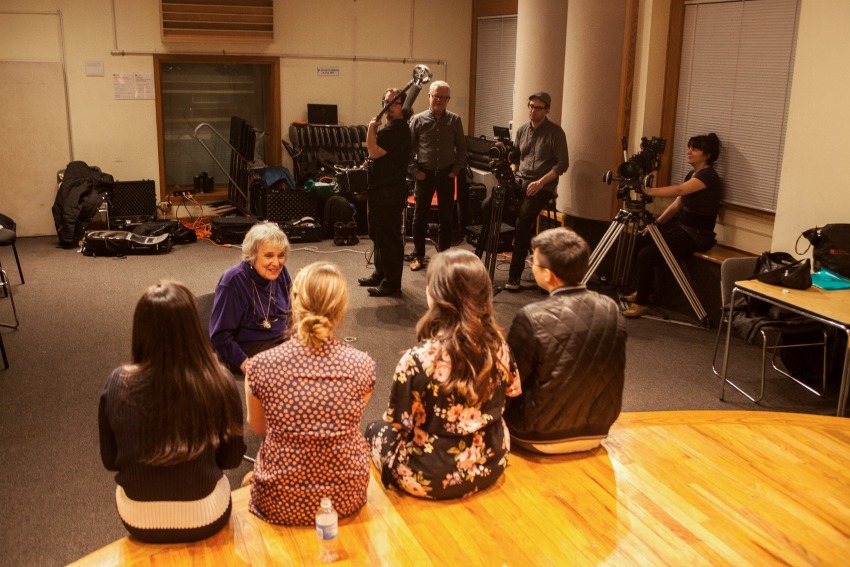 Director David D. Williams and his crew, D.P. Ramsey Fendall, Assistant Cameraperson Margo Sclafani and Sound Technician Baros Kaynak, commenced shooting DIRECTING RHODA in late February 2017. [Shooting the documentary DIRECTING RHODA in late February 2017. [Photo by Dan Nelken]
Director David D. Williams and his crew, D.P. Ramsey Fendall, Assistant Cameraperson Margo Sclafani and Sound Technician Baros Kaynak, commenced shooting DIRECTING RHODA in late February 2017. [Shooting the documentary DIRECTING RHODA in late February 2017. [Photo by Dan Nelken]
Fiscal Sponsorship
How did you land on the IFP as your fiscal sponsor? What
was that process to get them onboard?
Thanks to Lisa’s spade work and research, she identified IFP as the best organization for a film – and director – like this. Because we have been eager to move as quickly as possible, given that our subject is in the sunset of her distinguished career and life, being able to file an application for acceptance into the program at any time of year was important.
Equally important was the fact that someone making his first film could apply.
The process involved completing an online application that included our budget, synopsis/tagline, proposal and biographies of the crew.
We were thrilled to have been accepted.
Advice To Other First-Time Filmmakers
Any advice to a first time filmmaker like yourself embarking on their first documentary?
Be ready for a long process, with lots of twists and turns. Be prepared to pay everyone else but yourself during the early days.
And treat the whole endeavor as a small business. Having had a long career in publishing, marketing and, later, nonprofits I found that a lot of these twists and turns and egos and surprises are not all that unlike what happens in any business.
Documentary filmmaking is just, well… more fun! For me, a dream come true.
About David Williams

David Williams is a seasoned marketing executive, running his own full-service marketing and communications agency DYLAN MARKENG/NEW YORK. In addition, he served seven years as Executive Director of the Carl Schurz Park Conservancy, the oldest parks conservancy in New York City. David is a graduate of Northwestern University with a B.S. in Communications and also pursued a post-graduate curriculum in Cinema Studies at the Tisch School of Arts at New York University. David is currently embarking on his first documentary "the RHODA project".
Recommended For You
- How To Make A Documentary (And Win A $100K Grant) With Zero Experience
- Documentary Fundraising: Steps To Finding Money For Your Film
- Making My First Documentary: An Interview With Amber Talarico
Ready To Make Your Dream Documentary?
Sign up for our exclusive 7-day crash course and learn step-by-step how to make a documentary from idea to completed movie!
